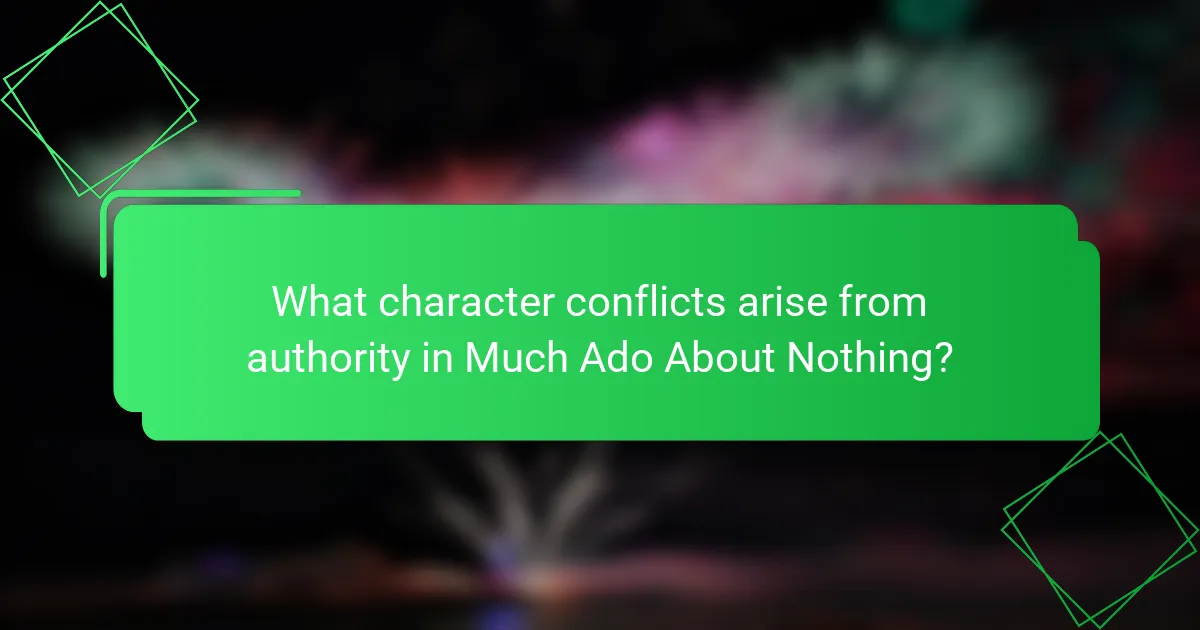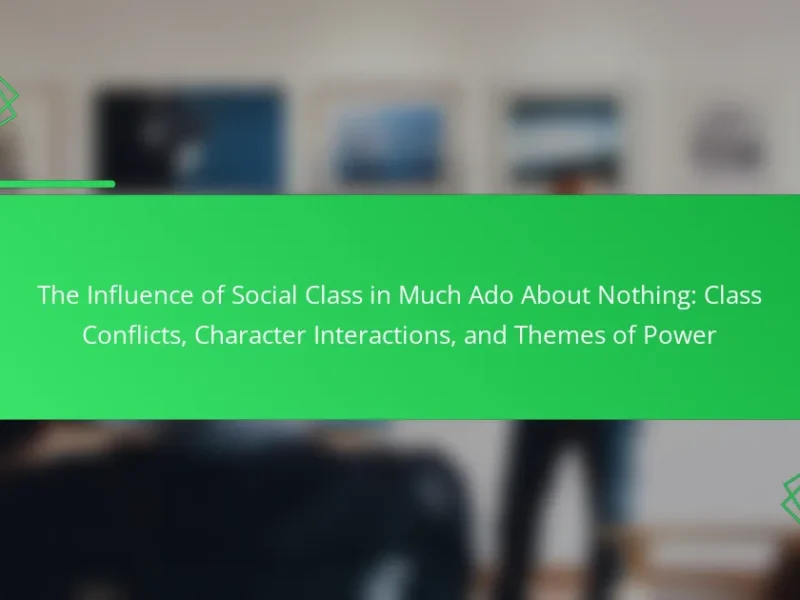
What is the Role of Authority in Much Ado About Nothing?
Authority in Much Ado About Nothing functions as a mechanism for control and social order. It influences character interactions and drives the plot. Characters like Don Pedro and Claudio represent societal authority. Their actions reflect the expectations placed upon them by society. Authority shapes relationships, particularly in matters of love and honor. For instance, Claudio’s public shaming of Hero illustrates the power dynamics at play. The misuse of authority leads to conflict and misunderstanding among characters. Ultimately, the play critiques the rigidity of social hierarchies. It highlights the consequences of authority when wielded without compassion.
How does authority manifest in the play’s characters and relationships?
Authority in “Much Ado About Nothing” is evident through hierarchical relationships and character interactions. Characters like Don Pedro and Claudio exhibit authority through social status and decision-making power. Don Pedro’s role as a prince allows him to influence the romantic pursuits of others. Claudio’s authority over his relationship with Hero is demonstrated through his public shaming of her. Additionally, Beatrice challenges traditional authority by questioning male dominance. The dynamics of authority create tension and conflict, particularly in the interactions between characters. These power struggles reflect broader social commentary on gender and class roles in the Elizabethan era. The play ultimately illustrates how authority shapes relationships and drives the narrative forward.
What are the different forms of authority depicted in the play?
The different forms of authority depicted in the play include social authority, moral authority, and political authority. Social authority is represented by characters such as Leonato, who holds power due to his status as the governor of Messina. Moral authority is exemplified by figures like Friar Francis, who guides characters toward ethical decisions. Political authority is seen in the actions of Don Pedro, who exerts influence in matters of courtship and social order. These forms of authority interact and conflict throughout the narrative, shaping character dynamics and plot developments. The interplay of these authorities highlights the complexities of power in social relationships.
How do characters respond to authority and its challenges?
Characters in “Much Ado About Nothing” respond to authority through resistance, compliance, and manipulation. For instance, Beatrice often challenges societal norms and authority figures. She questions traditional gender roles, asserting her independence. Claudio, on the other hand, initially complies with societal expectations regarding honor and reputation. His response to authority leads to conflict when he publicly shames Hero. Additionally, characters like Don John manipulate authority to create discord. His rebellious nature showcases a direct challenge to the established order. These varied responses highlight the complexities of power dynamics in the play. The interactions among characters reflect a broader commentary on authority and its impact on personal relationships.
Why is the concept of power dynamics significant in Much Ado About Nothing?
The concept of power dynamics is significant in Much Ado About Nothing because it shapes character relationships and societal norms. The play illustrates how authority influences love, conflict, and deception. Characters like Don Pedro and Claudio wield social power, affecting others’ actions and decisions. Their authority leads to manipulation and misunderstandings, particularly in the case of Hero. The interactions highlight the struggle for control and the consequences of miscommunication. Power dynamics also reflect societal expectations of gender roles, showcasing how women navigate male authority. This commentary on power structures enhances the play’s thematic depth and relevance.
What are the key power struggles presented in the narrative?
The key power struggles in “Much Ado About Nothing” involve authority, gender roles, and social status. The conflict between Don Pedro and Claudio illustrates the struggle for social dominance. Claudio’s public shaming of Hero highlights the power imbalance in gender relations. Additionally, Beatrice and Benedick’s witty exchanges reflect their challenge to traditional gender roles. The manipulation of truth by Don John represents a struggle for control and influence. Each character’s actions reveal the complexities of power dynamics within their society. These struggles ultimately critique societal norms and expectations.
How do these power dynamics influence character development?
Power dynamics significantly influence character development in “Much Ado About Nothing.” Characters often respond to authority, shaping their actions and relationships. For instance, Don Pedro’s status affects how others perceive and interact with him. His power allows him to manipulate situations, impacting characters like Claudio and Benedick. Claudio’s willingness to follow Don Pedro’s lead highlights the influence of authority on his judgment. Similarly, Beatrice’s defiance against societal norms showcases her resistance to power structures. The varying responses to authority create conflict and drive character growth. Ultimately, these dynamics reveal deeper themes of social hierarchy and personal agency within the narrative.

What character conflicts arise from authority in Much Ado About Nothing?
Character conflicts arising from authority in Much Ado About Nothing primarily involve the tension between Don Pedro and Claudio, as well as between Benedick and Beatrice. Don Pedro’s authority as a prince influences Claudio’s decisions and perceptions, leading to conflicts regarding honor and reputation. Claudio’s public shaming of Hero showcases how authority can manipulate personal relationships and incite conflict. Additionally, Benedick and Beatrice’s witty exchanges highlight the struggle for power within their romantic dynamic. Their conflict illustrates how societal expectations of gender roles affect personal authority and autonomy. Overall, authority shapes character interactions and drives the narrative’s conflicts.
How do conflicts between characters illustrate authority’s impact?
Conflicts between characters in “Much Ado About Nothing” illustrate authority’s impact by showcasing how power dynamics influence relationships and decisions. For example, the conflict between Claudio and Benedick highlights differing perceptions of honor and masculinity. Claudio’s authority, derived from societal expectations, leads him to publicly shame Hero, demonstrating how authority can dictate personal actions.
Additionally, the clash between Don John and the other characters reveals the destructive potential of authority when misused. Don John’s rebellion against societal norms showcases how authority can be subverted, resulting in chaos. This conflict ultimately drives the narrative, illustrating that authority shapes character motivations and consequences.
In summary, character conflicts in the play serve as a lens to examine the multifaceted effects of authority on individual behavior and societal structures.
What role does deception play in character conflicts related to authority?
Deception plays a crucial role in character conflicts related to authority in “Much Ado About Nothing.” It creates misunderstandings that challenge the established power dynamics. Characters like Don John use deception to undermine authority figures such as Claudio and Leonato. This manipulation leads to public humiliation and conflict. For instance, Don John’s trickery results in Claudio rejecting Hero at their wedding. Such acts of deception not only disrupt relationships but also highlight the fragility of authority. The consequences of these deceptions reveal the complexities of trust and power within the social hierarchy. Ultimately, deception serves as a catalyst for conflict, exposing vulnerabilities in characters’ authority.
How do societal expectations shape character interactions regarding authority?
Societal expectations dictate how characters interact with authority in “Much Ado About Nothing.” These expectations establish norms for behavior and respect towards figures of authority. For instance, characters like Claudio and Don Pedro exhibit deference to societal standards of masculinity and honor. This deference influences their decisions and interactions, particularly in matters of love and reputation. Additionally, characters such as Beatrice challenge these expectations, showcasing resistance to traditional authority. This contrast highlights the tension between individual desires and societal norms. The play illustrates how adherence to or defiance of societal expectations shapes character dynamics and conflicts related to authority.
What are the consequences of authority-related conflicts in the play?
Authority-related conflicts in the play lead to misunderstandings and social discord. These conflicts result in the breakdown of trust among characters. For example, Don John’s manipulation creates a rift between Claudio and Hero. This misunderstanding nearly leads to Hero’s public shaming and disgrace. The conflict escalates to the point of potential violence at the wedding. Ultimately, resolution of these conflicts restores harmony but highlights the fragility of social order. The consequences illustrate how authority can be misused, affecting relationships and community dynamics.
How do these conflicts affect the resolution of the plot?
Conflicts in “Much Ado About Nothing” significantly influence the plot’s resolution. The character conflicts, particularly between Claudio and Benedick, create tension and misunderstandings. Claudio’s public shaming of Hero leads to her feigned death, which acts as a catalyst for reconciliation. The resolution occurs when truths are revealed, restoring order and harmony. Authority figures, such as Leonato, play crucial roles in mediating these conflicts. Their interventions ultimately guide the characters towards forgiveness and unity. The interplay of personal and social conflicts emphasizes the themes of honor and reputation. This dynamic illustrates how conflicts shape character development and narrative outcomes.
In what ways do conflicts reflect broader social issues of the time?
Conflicts often mirror broader social issues by highlighting power dynamics and societal norms. In “Much Ado About Nothing,” the conflicts reveal gender roles and expectations of the Elizabethan era. For example, the treatment of Hero reflects societal views on female honor and virtue. The public shaming of Hero illustrates the consequences of these societal pressures. Additionally, the conflict between Claudio and Benedick showcases differing attitudes toward masculinity and loyalty. These character disputes reflect the tension between personal desires and societal expectations. Historical context shows that such themes were prevalent during the time, emphasizing the connection between individual conflicts and larger social issues.

How does Much Ado About Nothing serve as a social commentary on authority?
Much Ado About Nothing serves as a social commentary on authority by depicting the dynamics of power and its impact on relationships. The play illustrates how authority influences personal interactions and societal expectations. Characters like Don Pedro and Claudio represent traditional authority figures. Their decisions often lead to conflict and misunderstanding. For example, Claudio’s public shaming of Hero demonstrates the consequences of male authority over female reputation. Additionally, the character of Benedick challenges conventional notions of masculinity and authority. His evolution reflects a critique of rigid power structures. The interplay between deception and truth further highlights the fragility of authority. Ultimately, the play questions the legitimacy and morality of those in power.
What themes related to authority can be identified in the play?
Themes related to authority in the play include the conflict between social hierarchy and personal agency. Authority is often challenged by characters seeking autonomy. For example, Beatrice defies traditional gender roles, asserting her voice against male dominance. Claudio’s public shaming of Hero highlights the power dynamics in relationships. The play critiques the misuse of authority, particularly through figures like Don John. Additionally, the resolution of conflicts reveals a restoration of social order, emphasizing the importance of authority in maintaining societal norms. These themes reflect the tension between individual desires and societal expectations.
How do the play’s themes resonate with contemporary views on authority?
The play’s themes reflect contemporary views on authority by challenging traditional power structures. Characters like Don Pedro and Claudio represent established authority figures. Their actions highlight the complexities of trust and manipulation in relationships. This mirrors modern skepticism towards authority, where individuals question motives and integrity. The theme of deception reveals how authority can be undermined by personal agendas. In contemporary society, similar dynamics occur in politics and leadership. The play encourages audiences to critically assess authority figures and their influence. This relevance underscores the ongoing discourse about power and accountability in today’s world.
What lessons about authority can audiences draw from the play?
Audiences can draw several lessons about authority from “Much Ado About Nothing.” The play illustrates that authority can be misused, as seen in the character of Don John. His manipulation of others demonstrates how power can lead to chaos and mistrust. Additionally, the play shows that authority is often challenged by personal relationships. The interactions between characters like Beatrice and Benedick highlight the tension between societal expectations and individual desires. Furthermore, the resolution of conflicts underscores the importance of communication in exercising authority effectively. Ultimately, the play emphasizes that authority should be based on trust and integrity to maintain social harmony.
How can readers analyze authority in Much Ado About Nothing critically?
Readers can analyze authority in Much Ado About Nothing critically by examining character interactions and societal norms. The play presents various forms of authority, including social, gender, and moral. Characters like Don Pedro and Claudio embody social authority, influencing others’ actions and perceptions. Conversely, Beatrice challenges traditional gender roles, questioning male authority.
Analyzing these dynamics reveals the power struggles present in relationships. The contrasting views on honor and reputation highlight moral authority’s complexities. For example, Claudio’s public shaming of Hero demonstrates the impact of authority on individual lives.
Moreover, the comedic elements serve to critique authority, suggesting that social hierarchies are often arbitrary. By exploring these themes, readers gain insight into the play’s commentary on authority and its implications within society.
What analytical frameworks can be applied to understand authority in the play?
Power dynamics can be analyzed through various frameworks to understand authority in the play. One effective framework is structuralism, which examines how social structures influence character relationships. This approach reveals how authority is established and maintained within the societal norms of the time.
Another relevant framework is feminist theory, which explores gender roles and authority. It highlights how male characters exert power over female characters, reflecting societal expectations. This analysis can be seen in the interactions between characters like Claudio and Hero.
Additionally, post-colonial theory can be applied to examine authority in terms of cultural dominance. This framework allows for the exploration of how characters assert control over others based on social status and lineage.
Each of these frameworks provides a different lens through which to analyze authority, revealing the complexities of power dynamics in the play.
How can understanding authority enhance appreciation of the play’s complexities?
Understanding authority in “Much Ado About Nothing” deepens appreciation for the play’s complexities. Authority shapes character relationships and conflicts throughout the narrative. Characters like Don Pedro and Claudio wield power that influences social dynamics. Their decisions drive the plot and reveal societal expectations of honor and reputation. For instance, Claudio’s public shaming of Hero highlights the consequences of authority misuse. This misuse creates tension and propels the story toward resolution. Additionally, exploring authority reveals themes of manipulation and deception. The interplay between authority and individual agency enriches the audience’s understanding of character motivations. Thus, recognizing authority enhances the interpretation of the play’s intricate social commentary.
What practical insights can be gained from the exploration of authority in Much Ado About Nothing?
The exploration of authority in Much Ado About Nothing reveals insights into power dynamics and social structures. Characters like Don Pedro and Claudio wield authority, influencing relationships and decisions. Their actions demonstrate how authority can lead to misunderstandings and conflicts. For instance, Claudio’s public shaming of Hero illustrates the destructive potential of misused power. Additionally, the play critiques societal norms regarding gender and honor. The contrast between Beatrice’s assertiveness and traditional expectations showcases the tension between authority and individual agency. Overall, the narrative highlights the complexities of authority in shaping human interactions and societal expectations.
The primary entity of this article is authority as it is portrayed in Shakespeare’s “Much Ado About Nothing.” The article examines how authority functions as a mechanism for control and social order, influencing character interactions and driving the plot. It explores various forms of authority, including social, moral, and political, and highlights character responses to authority through compliance, resistance, and manipulation. Additionally, the article discusses key power struggles and conflicts that arise from authority, illustrating its impact on relationships and societal norms within the narrative. Finally, it provides insights into the play’s social commentary on authority, power dynamics, and their relevance to contemporary views.


